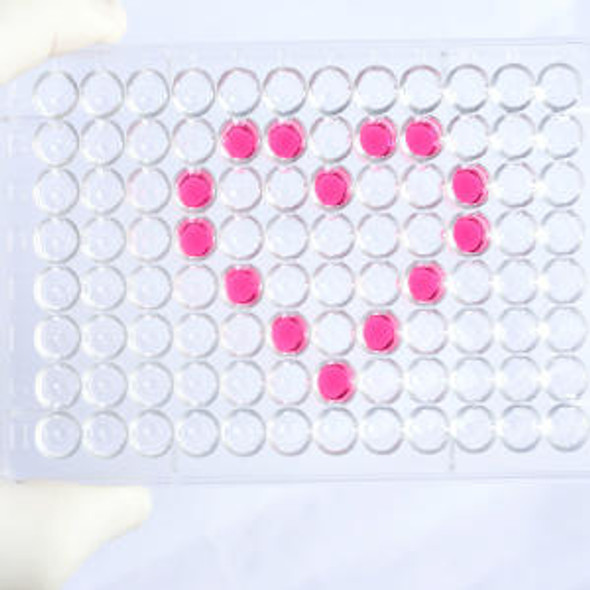Description
| Product Name: | Human SLPI Recombinant Protein |
| Product Code: | RPPB4709 |
| Size: | 10µg |
| Species: | Human |
| Target: | SLPI |
| Synonyms: | Antileukoproteinase, ALK1, ALP, BLPI, HUSI, HUSI-I, MPI, WAP4, WFDC4, WAP four-disulfide core domain protein 4, Protease inhibitor WAP4, Seminal proteinase inhibitor, Mucus proteinase inhibitor. |
| Source: | Escherichia Coli |
| Physical Appearance: | Sterile filtered colorless solution. |
| Formulation: | SLPI Human solution containing 20mM Tris-HCl pH-8.0, 2mM DTT, 0.1M NaCl & 20% glycerol. |
| Stability: | Store at 4°C if entire vial will be used within 2-4 weeks. Store, frozen at -20°C for longer periods of time. For long term storage it is recommended to add a carrier protein (0.1% HSA or BSA).Avoid multiple freeze-thaw cycles. |
| Purity: | Greater than 80.0% as determined by SDS-PAGE. |
| Amino Acid Sequence: | MGSSHHHHHH SSGLVPRGSH MSGKSFKAGV CPPKKSAQCL RYKKPECQSD WQCPGKKRCC PDTCGIKCLD PVDTPNPTRR KPGKCPVTYG QCLMLNPPNF CEMDGQCKRD LKCCMGMCGK SCVSPVKA |
SLPI is a secreted inhibitor which guards epithelial tissues from serine proteases. SLPI is localized in various secretions including seminal plasma, cervical mucus, and bronchial secretions, and has affinity for trypsin, leukocyte elastase, and cathepsin G. SLPI inhibitory effect contributes to the immune response by protecting epithelial surfaces from attack by endogenous proteolytic enzymes. SLPI protein has broad-spectrum anti-biotic activity. SLPI is an acid-stable proteinase inhibitor with strong affinities for trypsin, chymotrypsin, elastase, and cathepsin G. SLPI prevents elastase-mediated damage to oral and mucosal tissues.
SLPI Recombinant E.coli produced in E.Coli is a single, non-glycosylated polypeptide chain containing 128 amino acids (26-132 a.a.) and having a molecular mass of 14 kDa. The SLPI is fused to a 21 amino acid His-Tag at N-terminus and purified by proprietary chromatographic techniques.
| UniProt Protein Function: | SLPI: Acid-stable proteinase inhibitor with strong affinities for trypsin, chymotrypsin, elastase, and cathepsin G. May prevent elastase-mediated damage to oral and possibly other mucosal tissues. |
| UniProt Protein Details: | Protein type:Secreted; Inhibitor; Secreted, signal peptide Chromosomal Location of Human Ortholog: 20q12 Cellular Component: extracellular matrix; extracellular space Molecular Function:endopeptidase inhibitor activity; enzyme binding; protein binding; serine-type endopeptidase inhibitor activity Biological Process: antibacterial humoral response; immune response; innate immune response; negative regulation of protein binding; negative regulation of viral genome replication; response to lipopolysaccharide |
| NCBI Summary: | This gene encodes a secreted inhibitor which protects epithelial tissues from serine proteases. It is found in various secretions including seminal plasma, cervical mucus, and bronchial secretions, and has affinity for trypsin, leukocyte elastase, and cathepsin G. Its inhibitory effect contributes to the immune response by protecting epithelial surfaces from attack by endogenous proteolytic enzymes. This antimicrobial protein has antibacterial, antifungal and antiviral activity. [provided by RefSeq, Nov 2014] |
| UniProt Code: | P03973 |
| NCBI GenInfo Identifier: | 113636 |
| NCBI Gene ID: | 6590 |
| NCBI Accession: | P03973.2 |
| UniProt Secondary Accession: | P03973,P07757, B2R5H8, |
| UniProt Related Accession: | P03973 |
| Molecular Weight: | 14,326 Da |
| NCBI Full Name: | Antileukoproteinase |
| NCBI Synonym Full Names: | secretory leukocyte peptidase inhibitor |
| NCBI Official Symbol: | SLPI�� |
| NCBI Official Synonym Symbols: | ALP; MPI; ALK1; BLPI; HUSI; WAP4; WFDC4; HUSI-I�� |
| NCBI Protein Information: | antileukoproteinase |
| UniProt Protein Name: | Antileukoproteinase |
| UniProt Synonym Protein Names: | BLPI; HUSI-1 |
| Protein Family: | Antileukoproteinase |
| UniProt Gene Name: | SLPI�� |
| UniProt Entry Name: | SLPI_HUMAN |






